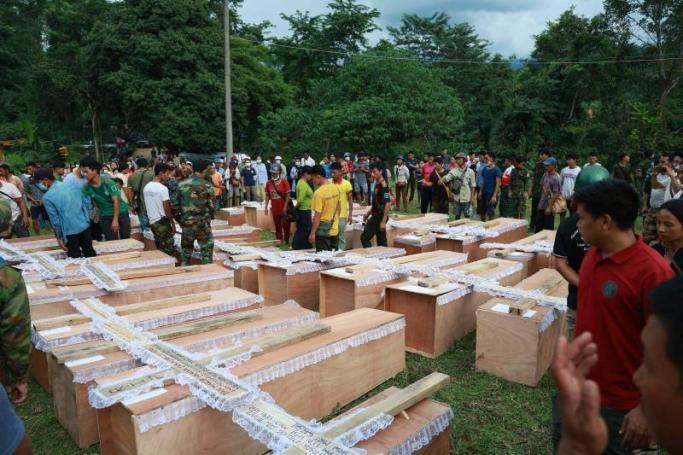Banks in Thailand became key players in funding for arms for the Myanmar military over the past year, according to a new report by the United Nations’ Special Rapporteur on Myanmar.
Thai banks were involved in $120 million worth of weapons and related materials exported to the neighbouring state in the 2023-24 fiscal year – “sustaining the junta’s campaign of violence and brutality against the people of Myanmar,” according to UN Rapporteur Tom Andrews.
Andrews said that while international efforts to isolate Myanmar’s State Administration Council (SAC), as the junta is now known, had succeeded on some levels, the military regime was still able to access money and weapons for its war against anti-coup forces.
ALSO SEE: Red Sea Attacks, US Tariffs on China Imports Choke Asian Ports
Exports of military weapons and supplies via Singapore “dropped dramatically, from over $110 million to just over $10 million” over the past year,” Andrews said, while military supplies from Russia and China also declined.
But “Thailand became the SAC’s leading source of military supplies purchased through the international banking system,” he said in the report, titled “Death Trade: How Banks and Governments Enable the Military Junta in Myanmar”.
Overall, Andrews identified 16 banks in seven countries that processed transactions linked to military procurement by Myanmar over the past two years, and said an additional 25 had provided correspondent banking services to Myanmar state-owned banks controlled by the junta.
“By relying on financial institutions that are willing to do business with Myanmar state-owned banks under its control, the junta has ready access to the financial services it needs to carry out systematic human rights violations, including aerial attacks on civilians,” he said.
Financial sanctions
Myanmar has been plunged into turmoil since the army seized power from an elected government in a 2021 coup, which sparked financial sanctions imposed on the military, banks and other associated businesses by Western countries.
More than three years on, a protest movement against the coup has evolved into a full-blown civil war, with the military accused of launching air strikes on insurgents and civilians alike as it has lost control of large swathes of territory.
The report found that the value of weapons, dual-use technologies, manufacturing equipment and other materials imported by the junta amounted to $253 million in the fiscal year to March 2024.
That was one-third less than in the previous year, the report said, thanks to efforts by Singapore to prevent companies based in the city-state from aiding the military regime.
Mr Andrews said that the progress showed that sanctions and other international efforts can have an impact on the junta’s ability to resupply, and therefore reduce the military’s ability to launch attacks such as air strikes that have killed hundreds of civilians in their villages.
“The very means by which they are attacking these villages are dependent upon their access to weapons and materials supplied from overseas,” he said.
Myanmar’s military denies accusations that it has committed atrocities against civilians and says it is fighting “terrorists”. Officials have played down the impact of sanctions and said they only delay the military’s plan to return the country to democracy.
Mr Andrews looked at purchases by entities controlled by the Myanmar defence ministry, identifying $630 million in military procurement between 2022 and 2024.
The value of exports from Singapore dropped from more than $120 million in the 2022 fiscal year to just over $10 million, the report said.
Thai firms linked to helicopter deals
However, Thailand partially filled the gap. Companies registered in Thailand transferred weapons and related materials worth $120 million in the 2023 fiscal year, compared with $60 million the year before, the report said.
“Thai banks have played a crucial role in this shift. Siam Commercial Bank, for example, facilitated just over $5 million in transactions related to Myanmar military in the year ending March 2023, but that number skyrocketed to over $100 million in the following year,” it said.
“In a striking example, in 2023, Thailand-registered companies became the SAC’s source for spare parts for its Mi-17 and Mi-35 helicopters that Singapore-registered companies provided previously,” the report said.
“The SAC uses these helicopters to transport soldiers and conduct airstrikes on civilian targets, such as the April 2023 attack on Pazigyi village in Sagaing region that killed approximately 170 people, including 40 children.”
Thai Prime Minister Srettha Thavisin told Reuters in an interview in April that Thailand would not take sides and would address all concerns in the conflict.
The military said members of the armed resistance were killed in the Pazigyi village strike.
- Jim Pollard with Reuters
























